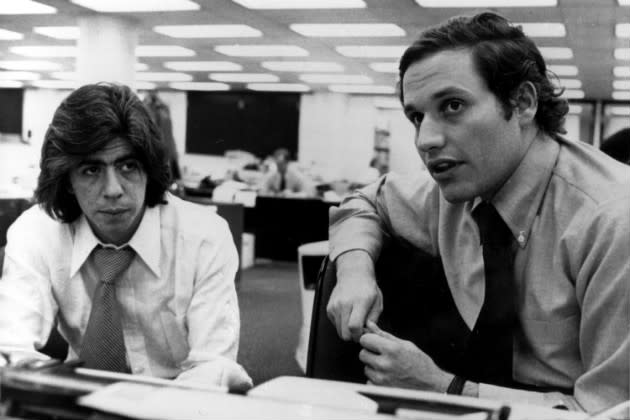 The Cutline
The CutlineWoodward and Bernstein share first Washington Post byline in 36 years

Bob Woodward and Carl Bernstein, arguably the two most famous newspaper reporters in American history, did something on Sunday they haven't done in 36 years: They shared a byline in the Washington Post.
Woodward and Bernstein, who are on a mini-publicity tour surrounding the 40th anniversary of the Watergate break-ins, published a joint opinion essay for the Post's Outlook section about what they've learned since first reporting on the scandal: President Richard Nixon, who was forced to resign in the wake of Watergate, was "far worse than we thought."
"The Watergate that we wrote about in The Washington Post from 1972 to 1974 is not Watergate as we know it today," they wrote. "It was only a glimpse into something far worse."
Today, much more than when we first covered this story as young Washington Post reporters, an abundant record provides unambiguous answers and evidence about Watergate and its meaning. This record has expanded continuously over the decades with the transcription of hundreds of hours of Nixon's secret tapes, adding detail and context to the hearings in the Senate and House of Representatives; the trials and guilty pleas of some 40 Nixon aides and associates who went to jail; and the memoirs of Nixon and his deputies. Such documentation makes it possible to trace the president's personal dominance over a massive campaign of political espionage, sabotage and other illegal activities against his real or perceived opponents.
So what did Watergate mean? To Woodward and Bernstein, it was "Nixon's five wars":
In the course of his five-and-a-half-year presidency, beginning in 1969, Nixon launched and managed five successive and overlapping wars--against the anti-Vietnam War movement, the news media, the Democrats, the justice system and, finally, against history itself. All reflected a mind-set and a pattern of behavior that were uniquely and pervasively Nixon's: a willingness to disregard the law for political advantage, and a quest for dirt and secrets about his opponents as an organizing principle of his presidency.
Long before the Watergate break-in, gumshoeing, burglary, wiretapping and political sabotage had become a way of life in the Nixon White House.
[Also read: Love letters reveal Nixon's sensitive side]
On CBS' "Face The Nation" on Sunday, Bernstein said that the op-ed was, in part, an effort to put to rest the notion that the Nixon administration's cover-up of the Watergate scandal was worse that the crime.
"The crimes were enormous, and that's what the tapes show," Bernstein said. "But what we found is, his White House became to a remarkable extent a criminal enterprise such as we've never had in our history."
More from the op-ed:
Nixon had lost his moral authority as president. His secret tapes--and what they reveal--will probably be his most lasting legacy. On them, he is heard talking almost endlessly about what would be good for him, his place in history and, above all, his grudges, animosities and schemes for revenge. The dog that never seems to bark is any discussion of what is good and necessary for the well-being of the nation.
On the day he left, Aug. 9, 1974, Nixon gave an emotional farewell speech in the East Room to his staff, his friends and his Cabinet. His family stood with him. Near the end of his remarks, he waved his arm, as if to highlight the most important thing he had to say.
"Always remember," he said, "others may hate you, but those who hate you don't win unless you hate them, and then you destroy yourself."
His hatred had brought about his downfall. Nixon apparently grasped this insight, but it was too late. He had already destroyed himself.
In an odd footnote, CBS' Bob Schieffer admitted that he "bungled" his chance to report on Watergate.
"The weekend the Watergate break-in came to light," Schieffer wrote in a blog post, "I tried to get out of town before I got assigned to the story."
Schieffer, then a junior correspondent at CBS' Washington bureau, had just been assigned to cover the Democratic and Republican conventions in Miami, an assignment "I had dreamed of all my life."
"I had the sinking feeling that [my boss] would pull me off the conventions and assign me to the break-in, a story that made absolutely no sense to me," he wrote. "Why would anyone break into a political headquarters? What secrets could possibly be found there? That's where you kept the yard signs and such. ... Why would anyone--especially anyone as far ahead in the polls as Nixon was at that point--break in to a campaign headquarters?
"So I laid low, got on down to Miami, had a great summer, and that led to a long career covering politics here," he added. "Still, I had made the WORST mistake a reporter can make. I just ASSUMED it didn't amount to anything."
